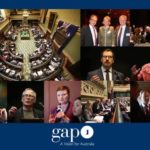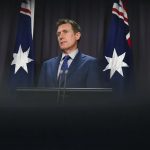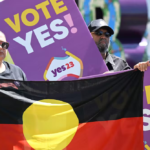Strengthening ties with Europe

Australia’s freshly drafted free-trade agreement with the United Kingdom is an example of what can be done when two countries decide to put some priority and effort into cooperation. Good results flow. What a shame that a free-trade agreement with the European Union seems harder to attain.
Australia has a Europe problem and Europe has an Australia problem. Failures of trust, attention and priority are at the heart of our difficulties. Key relationships are not being handled well. Our interests demand a better performance.
The change of mind on submarines was always going to test the friendship with Paris, but how it was done, rather than the decision itself, has led to anger. A ‘2+2’ meeting of foreign and defence ministers barely two weeks before the AUKUS bombshell ‘underlined the importance of the Future Submarine program’.
Then we have the prime ministerial photobombing of French President Emmanuel Macron at that Rome reception, as if a quick grin and grip would make the problem go away.
Australia could have taken the American approach. President Joe Biden apologised to Macron for inelegant handling, accepted his share of the blame but didn’t walk backwards on the AUKUS plan. The US secretary of state and vice president went to France on separate trips to make amends.
Foreign Minister Marise Payne this month visited Athens, Brussels, Vienna and London, but not going to Paris is both a decision and a statement. Australia is failing to right the relationship at senior political levels.
We should do so, and soon. Well before an election, the governor-general, foreign minister, a delegation of parliamentarians—anyone senior, really—should seek to be in France discussing the future relationship. The French may not accept a visit, but their grumpiness shouldn’t be the benchmark of our behaviour.
To be clear, Prime Minister Scott Morrison made the only decision to opt for AUKUS and nuclear propulsion. Australia had more than a few reasonable points of concern about progress with the French submarines.
An obvious European problem is the failure of some defence firms to support their Australian customers. Dumping the European Airbus Taipan helicopter in favour of American Black Hawks is the latest instalment of a long-running saga, but the multibillion-dollar decision last Thursday by Qantas to opt for Airbus over Boeing for its domestic aircraft must surely tell Paris that the door is open for industry cooperation.
France remains a friend, a military partner, a consequential Pacific neighbour, an ally against the obnoxious Chinese Communist Party, president of the European Union Council for the first half of 2022, a bulwark of NATO, a permanent member of the UN Security Council and a nuclear power.
Here is one example of the importance of France to Australia: last weekend the people of New Caledonia voted ‘non’ in a third and final referendum to determine if they would ‘accede to full sovereignty and become independent’.
Paris opted to hold the poll a year earlier than planning allowed, presumably to deliver the outcome Macron wanted before his April 2022 re-election bid. The indigenous pro-independence side boycotted the vote. It is unlikely to accept the outcome. This could spiral into violence.
Visiting French Polynesia in July, Macron warned: ‘Woe betide the small, woe betide the isolated, woe betide those who will undergo influence and attacks from hegemonic powers who will come to seek their fish, their technology, their economic resources.’
Macron was referring to China, by far the largest market for New Caledonia’s major exports of nickel and cobalt. Beijing is as active in Noumea as in any Pacific island capital.
Australia doesn’t need another China-dependent, broken-backed microstate emerging to our east, a short flight from Brisbane.
Working together, Canberra and Paris could decide to find new export markets for New Caledonia. We could encourage Australian foreign investment to reduce China’s influence.
Australia needs France as a partner in our region and as an advocate for democratic interests in an increasingly risky world. We cannot afford to have an angry France in the form of Foreign Minister Jean-Yves Le Drian in Jakarta on 24 November talking about the ‘trust crisis’ between Paris and Canberra.
Canberra and Paris have a choice. Echoing the ‘no’ slogan in the Scottish independence referendum, we can be ‘better together’ or ‘bitter together’. Only China wins from the latter approach.
Australia’s Europe problem is broader than France. We have underinvested for decades in building and deepening relationships with like-minded European countries.
Since the 1980s, Australia has been afflicted by a foreign policy mindset that has sought to narrow our interests to Asia with a nod to the US for security.
For Labor governments, there has been an element of ideology attached—that we were turning ourselves away from the reviled Anglosphere and from bloody wars in Europe. Australia would show how independent we were by forging a future in and with Asia.
Julia Gillard’s 2012 Asian century white paper and 2013 national security strategy represented the nadir of this approach. Australia’s economic future would be secured in a ‘relatively benign global landscape’ focusing on Asia, where ties with China, Japan, South Korea, India and Indonesia would drive growth. The rest of the world sunk below the horizons of foreign policy priority.
Coalition governments have been no better. Europe was something to be viewed through London. The Department of Foreign Affairs and Trade was to be starved, a policy blue baby deprived of oxygen. Forays to places like Africa happened only when we were seeking votes to get on the UN Security Council.
When Tony Abbott declared Australia ‘open for business’ on election night in 2013, the business that flooded in was Chinese. There was no interest in or appetite for thinking more broadly about a global approach to Australian foreign policy. As a result, Australia’s relations with European countries are anaemic, underachieving in trade and investment, uninterested in the strategic concerns and opportunities of the region, unreported in the Australian media and skeleton-crewed by officials who are told that the big diplomatic game is Asia.
In 2014, I was asked by Finance Minister Mathias Cormann to be part of the Australia–Germany Advisory Group to help expand the relationship. DFAT’s reaction was barely disguised lack of interest.
Gathered by Cormann in the cabinet room we were told by a languid senior official that Germany was on the ‘outer periphery of Australia’s interests’. At most, our work might take the relationship from the ‘outer edge to the inner edge’ of the periphery.
Germany is a global economic powerhouse, the core of European stability, an industrial innovator, and a big Australian defence industry and scientific partner, but for DFAT a peripheral player.
The combination of an aggressive China and Covid-19 wreaking havoc on global supply chains must surely alert us to the reality that Australia needs Europe. We need its democratic backing when China seeks to punish us with economic coercion.
When French, German, British and Dutch warships sail in the South China Sea to assert freedom of navigation, our reaction should be delight and offers of support, not dismissals of Europe’s lack of relevance to Asia.
Europe is flocking to the Indo-Pacific. Key countries and the EU have produced Indo-Pacific policies and are deepening contact. This presents an opportunity for Australia be a partner of choice.
At present, though, there is a doubt in some European capitals about Australia’s seriousness. DFAT identifies 20 formal bilateral dialogues with European countries as evidence of the opposite, but, having been involved in many, I can tell you these are exercises in bureaucratic capture, managed to deliver modest, unimaginative outcomes.
This is a vital moment for Australia to rethink its approach to Europe because Europe is rethinking its ties with Asia. We should start by developing a plan to expand engagement, driven with ambitious political leadership and hopefully a champion in cabinet to force outcomes.
This will take more effort and money. Let’s close a couple of the five consulates currently not doing business in China. We should expand our presence in European capitals, declaring that we are open for global business.
Along with a strong Quad and AUKUS, a strengthened European strategy spreads Australia’s bets to secure our interests.
Putting more effort into our European ties would signal a new maturity in Australian foreign policy, breaking from past obsessions to narrow the focus to Asia. In reality, this never lifted beyond lazy dependence on China. Australia has global interests that we should pursue with confidence. This will strengthen our position with Asia and persuade European friends that we have value to add in long-term, genuine and respectful partnerships.
This article was published by The Strategist.
Peter Jennings is the Executive Director of the Australian Strategic Policy Institute. He was Chief of Staff to the Minister for Defence from 1996 to 1998, Senior Adviser for Strategic Policy to the Prime Minister from 2002 to 2003 and Deputy Secretary for Strategy in the Defence Department from 2009 to 2012.













